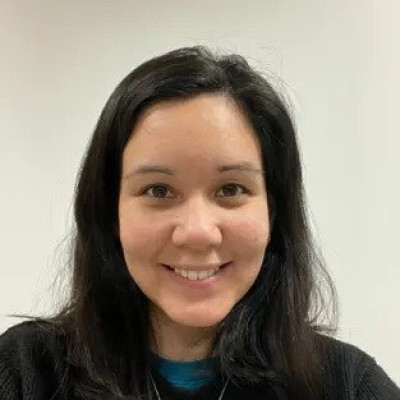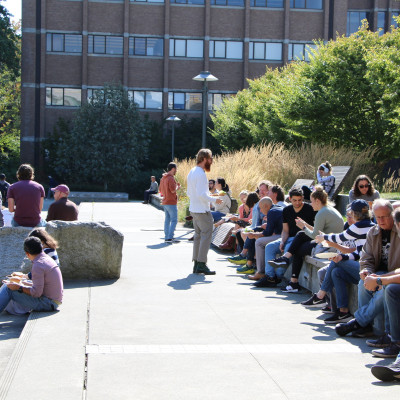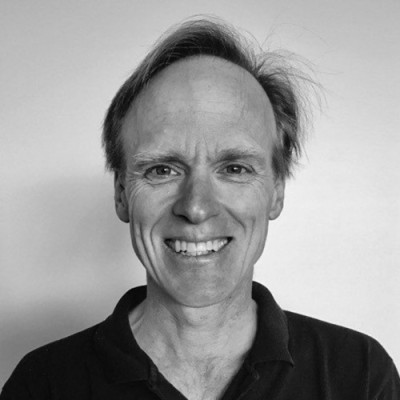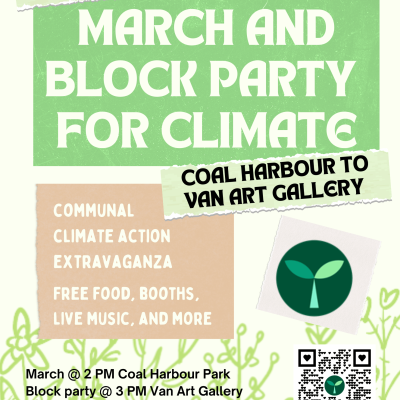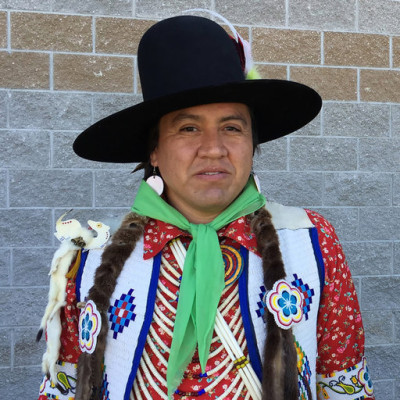News
Stay up-to-date with what's happening in EOAS
Meet Dr. Brenda D'Acunha - Ecohydrologist and Biogeochemist
Brenda was born and raised in Lima, Peru, and has a Chemistry degree from the Pontificia Universidad Catolica del Peru. She also has a MSc and PhD in Geological Sciences from the University of British Columbia. Her PhD research focused on comparing water and carbon fluxes from different biomes (Amazon, Cerrado and Pantanal) and land uses (natural, agriculture, pasture) in Mato Grosso, which is a Brazilian state that has experienced extensive deforestation and land use and land cover change to produce different commodities such as soybean and cattle. Brenda is also a mentor and co-director of the research experience for Peruvian undergraduates (REPU) program, which is a non-profit organization that sets-up 3-month research internships for Peruvian undergraduate students in different institutions around the world. In her spare time, Brenda also enjoys reading mystery novels, hiking and watching movies.
Unveiling Earth’s secrets from super-deep diamonds – EOAS professors in BBC Future
Dr. Evan Smith, Dr. Maya Kopylova
In the BBC Future article on September 22, 2022, Dr. Evan Smith (Research Scientist at Gemological Institute of America, UBC EOAS Adjunct Professor) and Dr. Maya Kopylova (EOAS Professor) talked about their latest findings in diamonds, particularly, the super-deep ones.
Even the most ordinary diamonds are unique as they formed far deeper than any other rocks inside our planet and emerge to the surface. "There are no other materials at the surface coming from a depth of 600km [373 miles], absolutely not," says Dr. Kopylova.
In 2020, Dr. Smith studied a 124-carat super-deep diamond, which was found to form at least 660km (410 miles) below the Earth's surface and within the lower mantle at pressures at least 240,000 times those at sea level (240 times the deepest part of the ocean, the Mariana Trench).
A lot of secrets about the Earth lie in super-deep diamonds like the 124-carat one, such as ancient carbon. Unlike regular diamonds, which are thought to start life from ancient seawater, super-deep diamonds start life as carbon dissolved within liquid metal, far down in the planet's interior. "It's like molten iron nickel alloy with sulphur and carbon dissolved in that," says Smith. "So it's a totally different kind of fluid, but it's still carbon fluid. It's undergoing whatever chemical or temperature changes, and that's causing carbon to crystallise out."
Most importantly, super-deep diamonds can provide important clues for the process of subduction, as they might be made of subducting tectonic plates that drifted down into the lower mantle in ancient times. "So we've seen diamonds that look like they're essentially pieces of the oceanic crust that have been carried down to the lower mantle," says Smith. "These diamonds are physically telling us that this process is physically true."
BBC Future: https://www.bbc.com/future/article/20220922-the-super-deep-royal-diamon…
Learn more about the UBC EOAS Diamond Exploration Laboratory: https://diamonds.eoas.ubc.ca/
EOAS Annual BBQ and Awards
On Sep 22, the Department of Earth, Ocean and Atmospheric Sciences (EOAS) held its annual BBQ outside the department buildings. Faculty, staff, graduate students and researchers gathered to reconnect with each other and welcome new people in the department.
We also recognized our annual department award winners:
Outstanding Teaching Assistant Award:
Undergraduate Instructor of the Year Award:
Excellence in Administration and Technical Services Award:
- Kimberly Tietjen (Graduate Program Coordinator)
Congratulations to our award winners and we wish everyone a wonderful academic year!
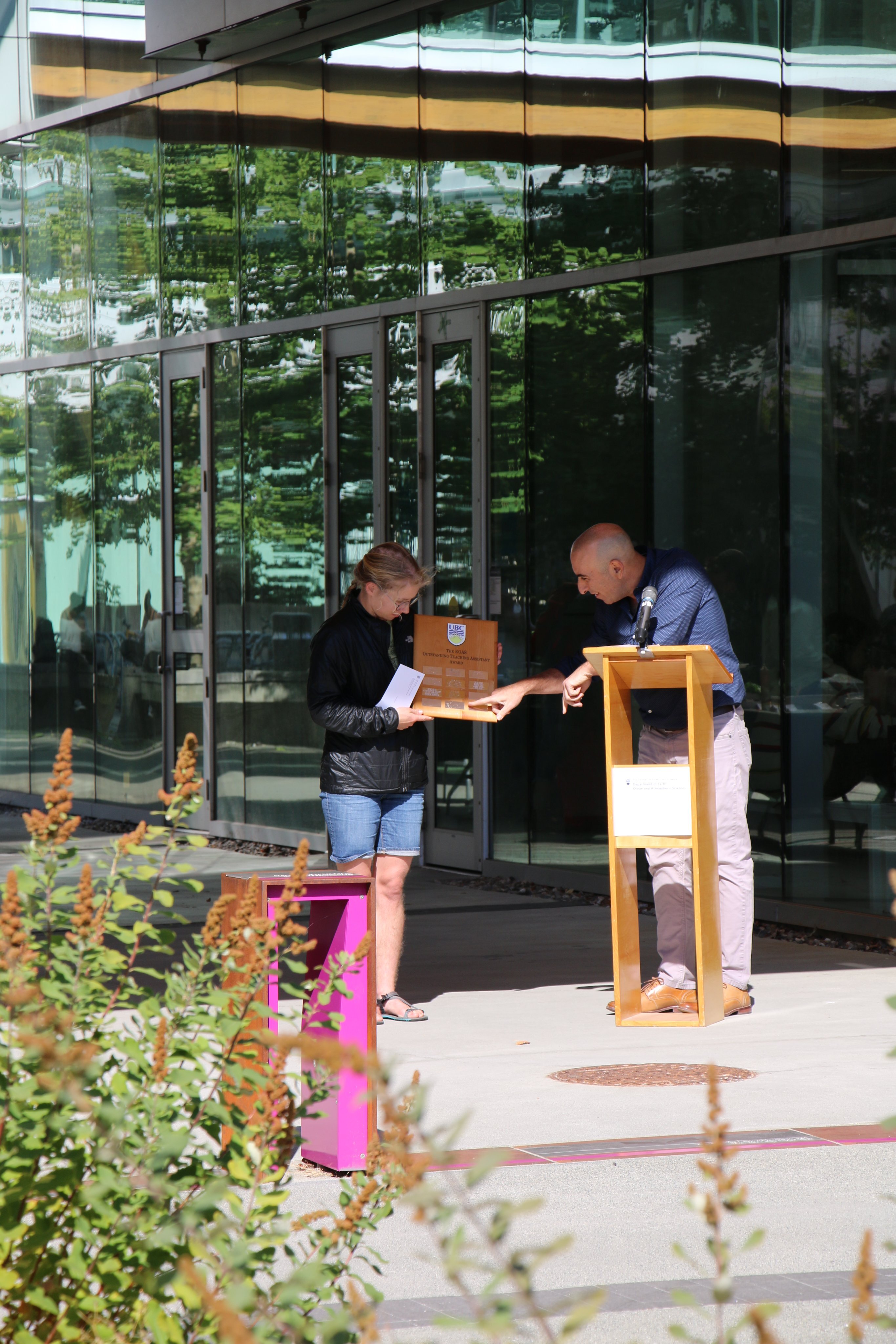
Birgit Rogalla (pictured with department head Philippe Tortell)
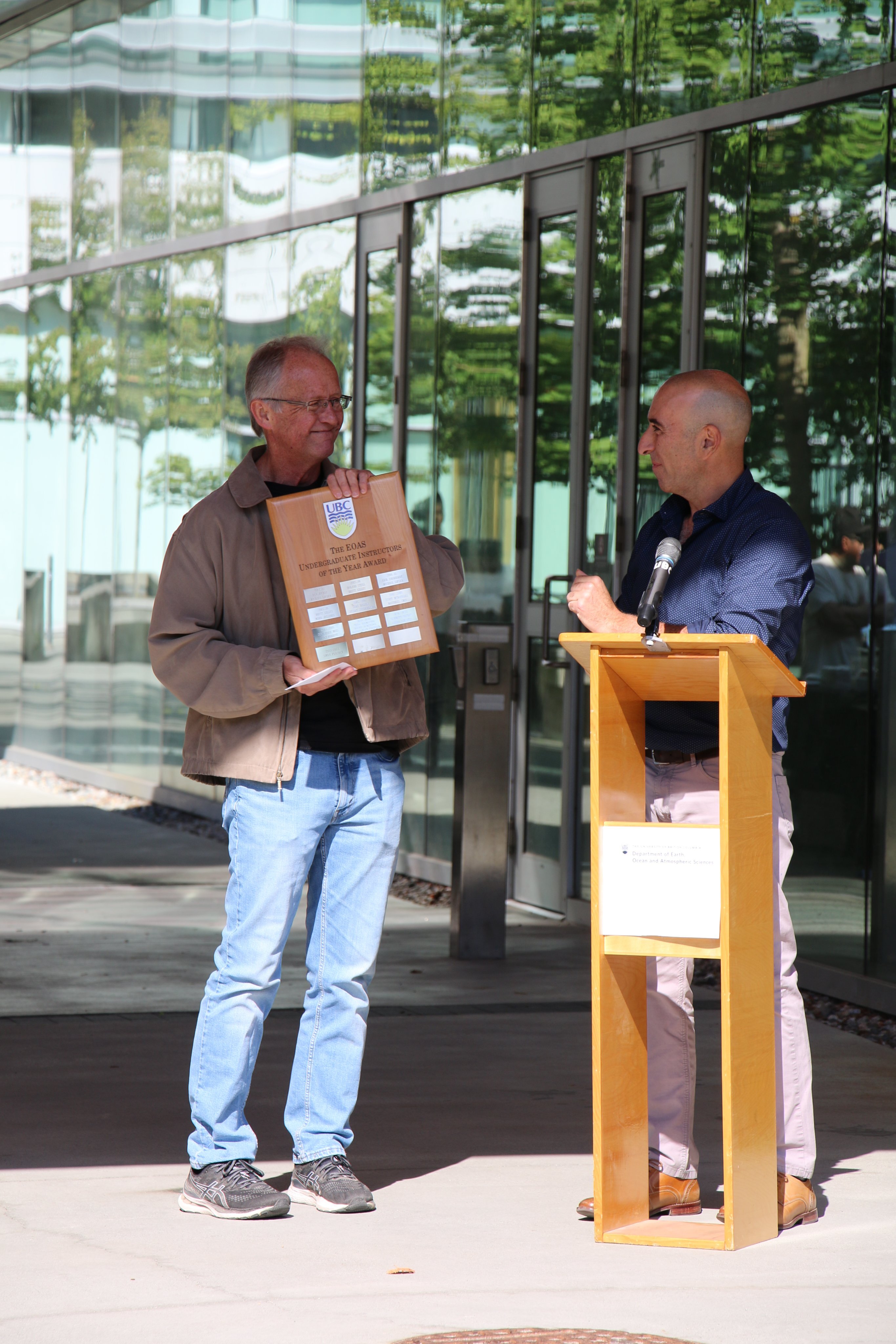
Simon Peacock
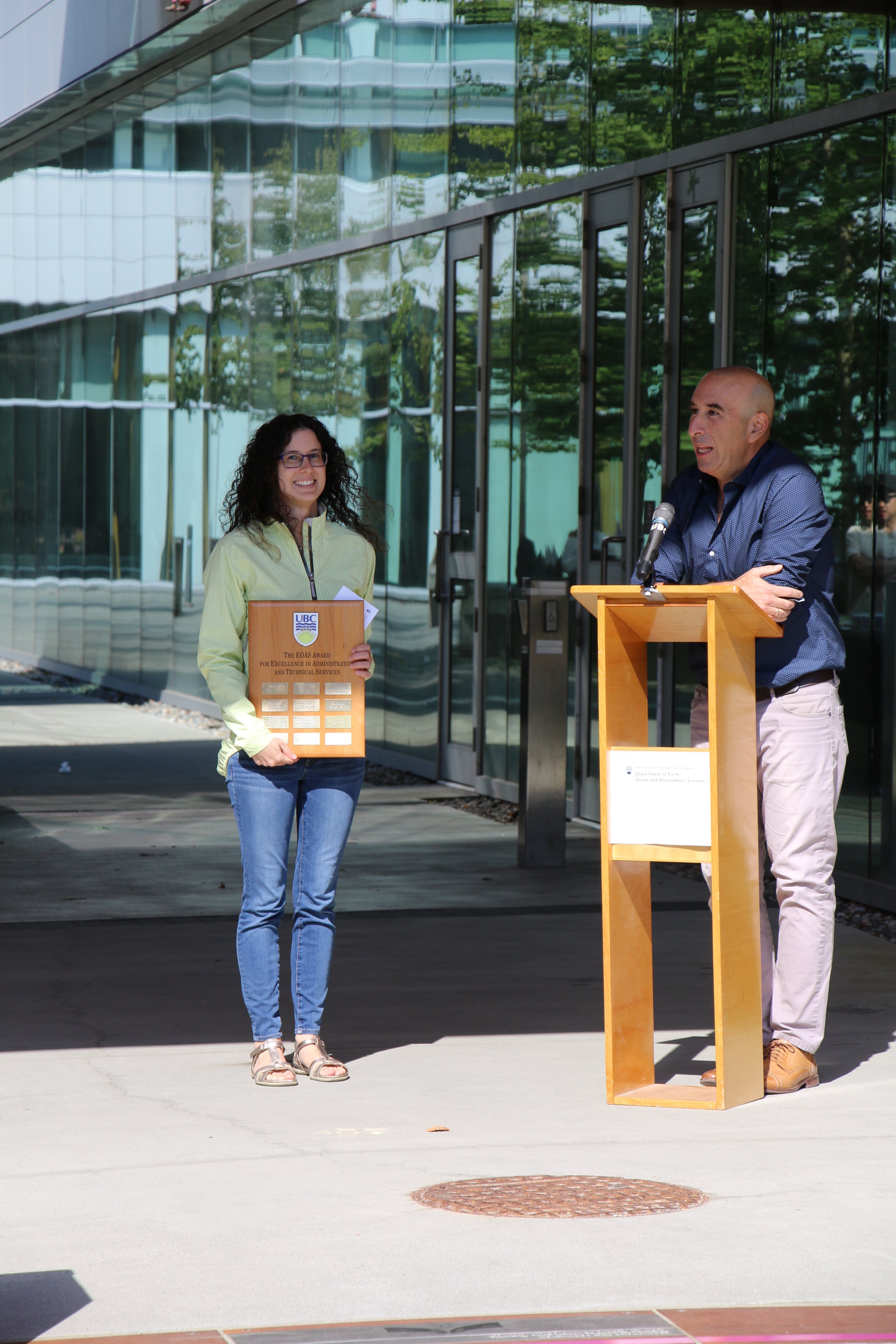
Kimberly Tietjen (Graduate Program Coordinator)
Meet Dr. Michael Bostock - Seismologist
Michael Bostock is a professor of seismology in the Department of Earth, Ocean and Atmospheric Sciences at the University of British Columbia (U.B.C.). He obtained his BSc (Applied Science) and M.Eng. at Queen's University in Kingston, PhD at the Australian National University. Prior to assuming his position at U.B.C., he held a postdoctoral fellowship at Utrecht University in the Netherlands. Bostock's current research interests focus on seismicity and structure of the Cascadia subduction zone and associated offshore plate boundaries. He is a Fellow of the American Geophysical Union (A.G.U) and was the 2010 A.G.U. Gutenberg lecturer.
Join us for the March and Block Party for Climate - Sep 23
On this global day of action, Sustainabiliteens is hosting a march and a block party for #PeopleNotProfit and a Just Transition. The march calls for bold policy action, with a focus on Indigenous sovereignty and a just transition for workers. The following block party will be a communal climate action extravaganza, bringing community members together through discussion circles, tangible actions, free food, and live entertainment. The event will also spotlight transformative organizations, inspiring speakers, and local businesses. This community-based mass mobilization aims to bring people of diverse backgrounds and viewpoints together to learn, connect, share ideas, and take action toward a Just Transition. The objective of creating a more just and sustainable society is one that requires learning and collaboration on a large-scale; the block party format is an attempt to build this community of collaboration and to reinstill hope and joy in the movement, all while pressuring those in power to prioritize climate justice. If you would like to find groups at UBC attending the strike, reach out to @climatejusticeubc on Instagram!
WHEN: Friday, September 23rd, 2-6pm
WHERE: March begins at Coal Harbour Park and ends at Vancouver Art Gallery, where the block party takes place
UBC Indigenous Strategic Initiative Fund - upcoming projects involving EOAS Faculty
EOAS Assistant Professor Shandin Pete will be involved with three upcoming projects funded through UBC's Indigenous Strategic Initiative Fund.
The first project, on which Shandin is the principal applicant, will explore the development of an Indigenous Science Research Seminar/Course Series. The focus of this project is to gain a better understanding for interest in and sustainability of a future course(s) on Indigenous Science Research, ways of knowing and Indigenous philosophies of science in the Faculty of Science at UBC. Shandin and colleagues seek to explore the development of a special topics pilot course in Indigenous Science, which will leverage the science and Indigenous expertise of the applicants. They plan to design the course to capture the diversity of Indigenous thought and perspectives of the Indigenous scholars’ respective Faculties and their own communities research traditions.
Shandin is a co-lead on “Yeendoo Diinehdoo Ji’heezrit Nits’oo Ts’o’ Nan He’aa (After Our Time, How Will the World Be)", a project led by the UBC Climate Emergency team and UBC Sustainability Hub, which will support the coordination and mobilization efforts of the Vuntut Gwitchin Government (VGG) to meet ambitious climate emission targets through expanded research and the practical application of Indigenous knowledge and science to develop climate solutions. In addition, the project will identify and enhance opportunities to support VGG’s nation-building efforts to develop skills and competencies that responds to the communities' climate emergency. The project will also learn with and from Vuntut Gwitchin First Nation (VGFN) about ethical, respectful and reciprocal partnerships that respect and activate multiple ways of knowing and being on the land and support Indigenous-led climate action. Finally, the project will engage students in multi-disciplinary and collaborative research initiatives that are at the intersection of Indigenous rights and climate justice.
Shandin and colleagues have also proposed to co-host UBC’s Inaugural First Salmon Ceremony in full and equal partnership with the Nations whose territories comprise what is now known as Vancouver, British Columbia, Canada, as well as neighboring Tribes. This ceremony will create a remarkable on-campus opportunity for inter-cultural learning, for Indigenous and non-Indigenous peoples to come together in celebration, and Indigenous Peoples to revitalize this cultural tradition. The resurgence of these ceremonies is central to the revitalization of Indigenous food and cultural systems and healing for Indigenous Peoples. In the Pacific Northwest, salmon are central to Indigenous lives, well-being, and knowledges. Since time immemorial, Indigenous Peoples from California to Kamchatka have acknowledged the annual return of salmon through ceremony to practice gratitude for the gift of salmon. This ceremony is a vital act of witnessing and intergenerational knowledge transfer where salmon are honoured through story, song, and prayer, and the first salmon caught is prepared, divided, and shared with those in attendance. Following this feast, bones and remains are gathered, placed on cedar boughs, and returned to the sea to nourish the waters and give thanks. This ceremony has been violently interrupted through colonization, thus altering the sacred balance between people and waters, but Indigenous Peoples across the Pacific Rim are putting it ‘violently’ back in place (the latter violence refers to the great strength and sound with which these practices are returning and made visible).
Learn more about Shandin's work: https://www.eoas.ubc.ca/people/shandinpete
Listen to his podcast Tribal Research Specialist
Read his most recent publication: Tribal Perspectives on Preventing the Introduction of Zebra Mussels into Flathead Lake
